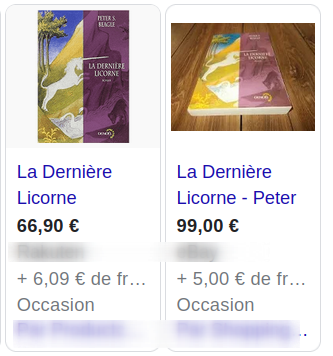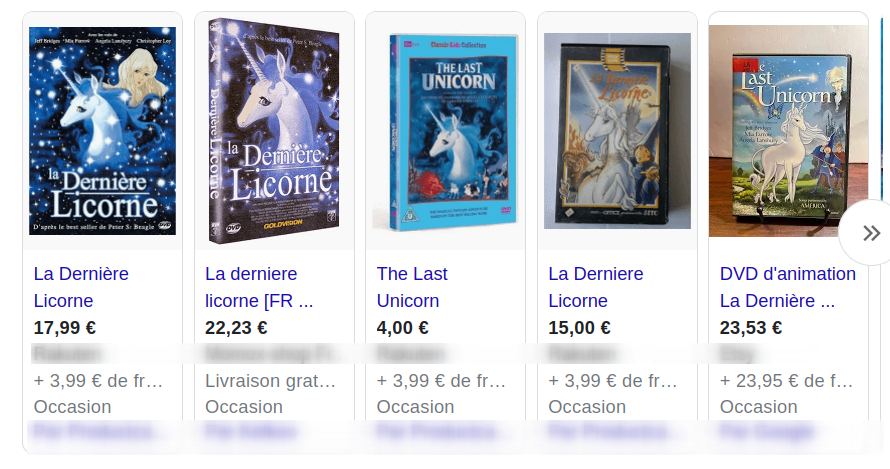JRRVF - Tolkien en Version Française - Forum
Vous n'êtes pas identifié(e).
- Contributions : Récentes | Sans réponse
Annonce
Pages : 1 bas de page
#1 27-04-2000 13:14
- Hisweloke
- Inscription : 1999
- Messages : 1 622
Peter S. Beagle
Préface de Peter S. Beagle à sa Dernière chanson de Sirit Byar (Denoël, Présence du Futur):
"Je ne crée pas non plus de trilogies épiques regorgeant d'elfes, de nains, de magiciens et d'hommes affrontant l'Armageddon ou agitant quelque épée magique et divers bijoux enchantés pour défier tel Sombre Seigneur (ou en tout vas Véreux) ou tel autre. Remarquez... Je voue une admiration sans borne à J.R.R. Tolkien depuis que je suis tombé dans ses écrits, à la bibliothèque Carnegie de Pittsburgh, en 1958, alors qu'il appartenait à une genre, tout comme son univers, qui était déjà dans les lieux depuis cinquante ans. Les cartes, les chartes, les arbres généalogiques, les histoires d'une nuit, les fragments incohérents d'un langage à moitié inventé - rien de tout cela n'a de signification pour le commun des mortels. Comme de nombreux écrivains j'ai vénéré et honteusement plagié, à une époque, des gens comme Thorne Smith, TH White, Lord Dunsany [...], mais honnêtement, il ne m'est jamais venu à l'idée de copier Tolkien. Je n'en voyais pas l'intérêt."
L'emphase centrale est de moi.
Didier.
Hors ligne
#2 11-10-2000 06:54
- greenleaf
- Inscription : 2000
- Messages : 156
Re : Peter S. Beagle
Je n'ai jamais lu de ses œuvres de fiction, mais je voyais ce P.S. Beagle d'un bon œil, vu sa contribution au scénario du DA de Ralph Bakshi, somme toute assez respectueux de l'œuvre écrite, et pour un court essai écrit en 1966 qui a paru dans différentes publications 'tolkiennesques' intitulé "Tolkien's Magic Ring".
Vous me direz que le mot 'magic' est plutôt mal choisi, mais il faut se rappeler que Beagle n'était pas aussi savant que nous: il n'avait pas HoME à sa disposition, ni CLI, ni même Le Silmarillion. Conséquemment je trouve son appréciation plutôt lucide. Destinée aux non initiés, elle se concentre avant tout sur l'expérience du lecteur, sur l'étrange attachement à l'œuvre qui caractérise la majorité des Tolkiendili.
Comme ce forum a pour but de rassembler le plus d'infos, de susciter des réflexions, et que j'ai le texte complet en format Word (en anglais, hélas), je serais tenté de faire un beau copier-coller qui ne me coûterait rien, mais il y a la question des droits d'auteurs. Voici tout de même quelques extraits, ne serait-ce que pour nous consoler de la critique peu élogieuse d'Edmund Wilson que nous avons découverte récemment. ;-)
"[...]
The Lord of the Rings and its prologue, The Hobbit, belong, in my experience, to a small group of books and poems and songs that I have truly shared with other people. The strangest strangers turn out to know it, and we talk about Gandalf and mad Gollum and the bridge of Khazad-dûm while the party or the classroom or the train rattles along unheard. Old friends rediscover it, as I do—to browse through any book of the Ring trilogy is to get hooked once more into the whole legend—and we talk of it at once as though we had just read it for the first time, and as though we were remembering something that had happened to us together long ago. Something of ourselves has gone into reading it, and so it belongs to us.
The country of the book, Middle-earth, is a land much like our own, as mythical, but no more so. Its sunlight is remembered from the long summers of childhood, and its nightmares are equally those of children: overwhelming visions of great, cold shapes that block out the sunlight forever. But the forces that form the lives of the dwellers of Middle-earth are the same that make our lives—history, chance and desire. It is a world bubbling with possibility, subject to natural law, and never more than a skin away from the howling primal chaos that waits outside every world; it is no Oz, no Great Good Place, but a world inhabited by people and things, smells and seasons, like our own.
[...]
The Lord of the Rings is the tale of Frodo's journey through a long nightmare of greed and terrible energy, of his education in both fear and true beauty, and of his final loss of the world he seeks to save. In a sense, his growing knowledge has eaten up the joy and the innocent strength that made him, of all the wise and magic people he encounters, the only one fit to bear the Ring. As he tells Sam Gamgee, the only friend who followed him all the long way to the fire, "It must often be so . . . when things are in danger: someone has to give them up, lose them, so that others may keep them." There are others in Middle-earth who would have willingly paid that price, but certainly none to whom it would have meant as much.
That is the plot; but the true delight of the book comes from the richness of the epic, of which The Lord of the Rings is only a few stanzas. The structure of Tolkien's world is as dizzyingly complex and as natural as a snowflake or a spiderweb: the kingdoms of Men in Middle-earth alone have endured for three ages, and each of their histories, as Tolkien sets them forth in the fascinating Appendix, contains enough material for a ballad as long as The Lord of the Rings. And there are other, older peoples—notably the immortal Elves—whose memories go back to the Elder Days, long before good or evil moved in Middle-earth; there are the Dwarves and the Ents—the shepherds of the trees, "old as mountains"—and there is Tom Bombadil, who belongs to no race, no mission and no age.
Tolkien tells us something of each of these peoples—their songs, their languages, their legends, their customs and their relations with one another—but he is wise enough not to tell all that he knows of them and of their world. One can do that with literary creations, but not with anything living. And Middle-earth lives, not only in The Lord of the Rings but around it and back and forth from it. I have read the complete work five or six times (not counting browsing, for which this essay is, in part, an excuse), and each time my pleasure in the texture of it deepens. It will bear the mind's handling, and it is a book that acquires an individual patina in each mind that takes it up, like a much-caressed pocket stone or piece of wood. At times, always knowing that I didn't write it, I feel that I did.
[...]
The real surge of interest in Tolkien's writing has been among high school and college students. Students make strange and varied works their own, and if there is any significance to their adoption of The Lord of the Rings—beyond the fact that it's a good book—the hell with it; one or another of our explainers of the young will take note of it pretty soon. But there is one possible reason for Tolkien's popularity that I would like to put forward, because it concerns the real strength of The Lord of the Rings. Young people in general sense the difference between the real and the phony. They don't know it—when they begin to know that difference, and try to articulate it, then they are adults and subject to all the pains and fallibilities of that state. They can be misled by fools or madmen, but they sense the preacher who doesn't feel a word of his sermon, the mountebank who is putting them on, the society that does not believe in itself. They rarely take a phony of any sort to their hearts.
Tolkien believes in his world, and all those who inhabit it. This is, of course, no guarantee of greatness—if Tolkien weren't a fine writer, it could not make him one—but it is something without which there is no greatness, in art or in anything else, and I find very little of it in the fiction that purports to tell me about this world we all live in. This failure of belief on the authors' part is, I think, what turns so many books that mean to deal with the real things that really happen to the real souls and bodies of real people in the real world into the cramped little stages where varyingly fashionable marionettes jiggle and sing. But I believe that Tolkien has wandered in Middle-earth, which exists nowhere but in himself, and I understand the sadness of the Elves, and I have seen Mordor.
And this is the source of the book's unity, this deep sureness of Tolkien's that makes his world more than the sum of all its parts, more than an ingenious contrivance, more than an easy parable of power. Beyond the skill and invention of the man, beyond his knowledge of philology, mythology and poetry, The Lord of the Rings is made with love and pride and a little madness. There never has been much fiction of any sort made in this manner, but on some midnights it does seem to me that my time is cheating itself of even this little. So I have read the tale of the Ring and some other books many times, and I envy my children, who have not yet read any of them, and I envy you if you have not, and wish you joy."
Hors ligne
#3 11-01-2023 01:19
- Hisweloke
- Inscription : 1999
- Messages : 1 622
Re : Peter S. Beagle
Oh. Je ne me souvenais pas d'avoir évoqué Peter S. Beagle en ces lieux...
... Il y a si longtemps...
De nos jours, là présentement, la Dernière Licorne est introuvable à prix correct...
Je parle évidemment de la traduction française du livre...
... L'adaptation en dessin animé est encore trouvable, semble-t-il ...
Peter S. Beagle, auteur... et à l'occasion co-scénariste de l'adaptation du SdA par Ralph Bakshi... et à son tour, logiquement, adapté par Rankin & Bass. Beagle, hein, pas le SdA. Enfin si, aussi. Bref...
Un souvenir d'enfance, quoi...
D.
Hors ligne
#4 11-01-2023 10:26
- Elendil
- Lieu : Velaux
- Inscription : 2008
- Messages : 1 200
Re : Peter S. Beagle
Le dessin de couverture des DVD de gauche me dit quelque chose, je pense donc avoir vu ce dessin animé il y a fort longtemps (peut-être en partie seulement, car la télévision et moi, cela faisait deux). J'ignorais cependant que c'était l'adaptation d'un roman, encore moins d'un roman de Beagle.
E.
En ligne
Pages : 1 haut de page

